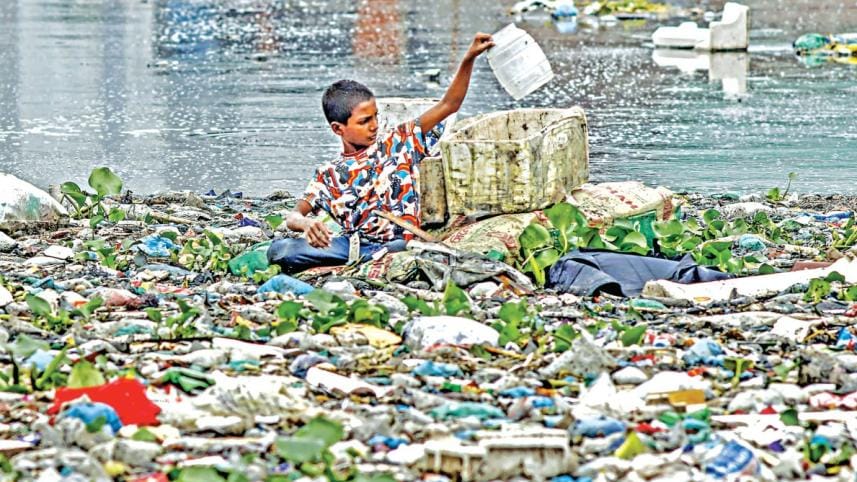When waste meets AI, resources are better managed

Artificial Intelligence, often linked to self-driving cars, robots or ChatGPT, is redefining how the world collects, sorts, and reuses waste. Several countries are using AI to process waste, reflecting their priorities, level of governance and innovation.
In Barcelona, Spain, for example, smart bins equipped with sensors monitor fill levels in real-time, allowing waste collection trucks to optimise their routes and collect bins only when necessary. This system has reduced waste collection costs and CO2 emissions by limiting unnecessary garbage truck trips. Seoul, South Korea's capital, has implemented a "pay-as-you-throw" system, supported by AI-driven data, where households pay for waste by weight. This has significantly reduced waste and boosted recycling rates. India's Chennai has piloted Airbin, where bins use sensors and Internet of Things (IoT)—a network of physical objects that uses technology to connect and exchange data over the internet—to send real-time alerts to municipal authorities when they are full. Ireland has over 3,000 solar-powered smart compactors that hold five times more than traditional bins, cut trips, and keep streets cleaner. Each of these examples shows that AI does not replace human effort; it multiplies it.
AI in waste management usually begins with the basics: sensors in bins to track filling levels. The next stage is prediction which means systems learning to forecast when and where waste will be produced. The most advanced stage is sorting, where robots and machines identify materials, turning garbage into valuable resources. This step-by-step journey is important. Few countries leap straight to robots. Most begin with data- knowing how much waste is produced, when, and where. From there, smarter collection routes are planned. Then, recycling and resource recovery improve.
Although, AI-based systems can work anywhere, adaptation matters. In areas without steady electricity and internet connectivity, bins can run on solar panels. Where internet is weak, SMS alerts work. Replication also depends on local government institutions (LGIs) as they are central to waste management. In developing countries, LGIs often face limited budgets, insufficient staff, and inadequate infrastructure. AI can help them overcome these challenges by improving efficiency and reducing costs. Smart bins with sensors can monitor waste levels in real time, so trucks collect only when necessary, saving fuel, labour, and cutting emissions. Prediction systems can forecast waste surges after festivals, public gatherings, or harvests, allowing LGIs to plan resources ahead. AI-assisted sorting, combined with manual labour, can improve recycling accuracy for plastics, metals, and paper, even in low-resource settings.
Globally, "3R" principles—reduce, reuse, recycle—are now being mainstreamed. Extended Producer Responsibility (EPR) laws hold companies accountable for packaging. Circular economy strategies aim to keep resources in use. AI helps enforce these laws by giving clear data on who is polluting. Besides, AI integration aligns with private sector's sustainability goals. In Asia Pacific, Microsoft partnered with groups like Sustainable Coastlines to use AI for categorising and tracking litter on beaches. In Hong Kong, Microsoft supported "Clearbot Neo", an AI-enabled robotic boat that recognises and logs types of trash collected from waterways using cameras and AI systems. Thus, companies can provide funding, technology, or logistics support to gain ESG recognition, brand value, and compliance with sustainability commitments. AI-driven waste management systems give them measurable impact reports—a key incentive for investment. Local governments in developing countries can use such partnerships to scale solutions while reducing costs.
Bangladesh, too, can experiment with AI-waste management as it has the institutional framework to experiment with AI-based waste management: the National 3R Strategy for Waste Management, Solid Waste Management Rules 2021, e-governance initiatives and the upcoming Extended Producer Responsibility (EPR) guideline. However, the enforcement requires strong push. Many LGIs lack equipment, trained staff, and even reliable electricity and internet connectivity. The challenge, of course, is cost. Sensors, software, and training require money. But under EPR, companies responsible for packaging waste can be required to fund smart collection pilots. LGIs can save fuel costs by using data-driven routes, freeing resources to reinvest in technology. And where gaps remain, public-private partnerships with recycling industries and development partners can close the loop.
Bangladesh already has laws that governs how data is collected and used. Linking these frameworks with waste collection and processing laws will ensure that waste data is treated responsibly, while also giving LGIs digital dashboards to enforce 3R and EPR obligations. To make this real, Bangladesh needs to pilot the concept, beginning with markets of a city corporation, where organic waste is overwhelming. A rural pilot could cluster 5-10 villages under one upazila, using solar bins with SMS alerts. And a producer-funded pilot, targeting plastic packaging, could show how EPR can finance AI tools.
Bangladesh can leverage AI not just to manage waste but to operationalise its legal frameworks effectively. The world is already moving; the question is whether we will align technology, law, and governance to catch up or remain buried under our own garbage.
Sabbir Rahman Khan and Saiduzzaman Pulak are development practitioners at Swisscontact.
Saief Manzoor-Al-Islam is a development practitioner at WaterAid.
Views expressed in this article are the authors' own.
Follow The Daily Star Opinion on Facebook for the latest opinions, commentaries and analyses by experts and professionals. To contribute your article or letter to The Daily Star Opinion, see our guidelines for submission.





 For all latest news, follow The Daily Star's Google News channel.
For all latest news, follow The Daily Star's Google News channel. 

Comments